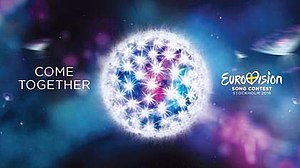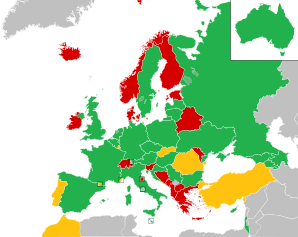Eurovision Song Contest 2016
| Eurovision Song Contest 2016 | |
|---|---|
| Come Together | |
 |
|
| Dates | |
| Semi-final 1 | 10 May 2016 |
| Semi-final 2 | 12 May 2016 |
| Final | 14 May 2016 |
| Host | |
| Venue | Ericsson Globe, , Sweden |
| Presenter(s) | |
| Executive supervisor | Jon Ola Sand |
| Executive producer |
|
| Host broadcaster | Sveriges Television (SVT) |
| Opening act |
|
| Interval act |
|
| Participants | |
| Number of entries | 42 |
| Debuting countries | None |
| Returning countries | |
| Withdrawing countries | |
| Vote | |
| Voting system | Each country awards two sets of 12, 10, 8–1 points to their 10 favourite songs: one from their professional jury and the other from televoting. |
| Nul points | None |
| Winning song | |
| Eurovision Song Contest: Stockholm 2016 | ||||
|---|---|---|---|---|
 |
||||
| Compilation album by Eurovision Song Contest | ||||
| Released | 15 April 2016 | |||
| Genre | Pop | |||
| Length |
|
|||
| Label | Universal | |||
| Eurovision Song Contest chronology | ||||
|
||||
The Eurovision Song Contest 2016 was the 61st edition of the Eurovision Song Contest. It took place in the Ericsson Globe in , Sweden, following Sweden's victory at the 2015 contest in Vienna with the song "Heroes", performed by Måns Zelmerlöw. This was the third time the contest had taken place in Stockholm, after 1975 and 2000, the latter also being held at the Globe. The contest consisted of two semi-finals on 10 and 12 May and the final on 14 May 2016, with all three live shows hosted by Zelmerlöw and Petra Mede.
The winner of the contest was Ukraine with the song "1944", performed by Jamala. This was Ukraine's second win and its first since 2004. This was the first time since the introduction of professional jury voting in 2009 that the overall winner won neither the jury vote, which was won by Australia, nor the televote, which was won by Russia, with Ukraine placing second in both. It was also the first song with lyrics in Crimean Tatar to win or enter the contest.
Forty-two countries participated in the contest. Bosnia and Herzegovina, Bulgaria, Croatia and Ukraine returned after absences from recent contests, while Australia also returned after debuting as a special guest in 2015. Portugal withdrew, largely due to their national broadcaster's insufficient promotion of their music-based media, while Romania had originally planned to participate, but was forced to withdraw due to repeated non-payment of debts by their national broadcaster to the European Broadcasting Union (EBU). The contest was also the first to implement a voting system change since 1975: each country's professional jury points were announced largely as before, while the results of each national televote were combined and announced in reverse order.
...
Wikipedia


